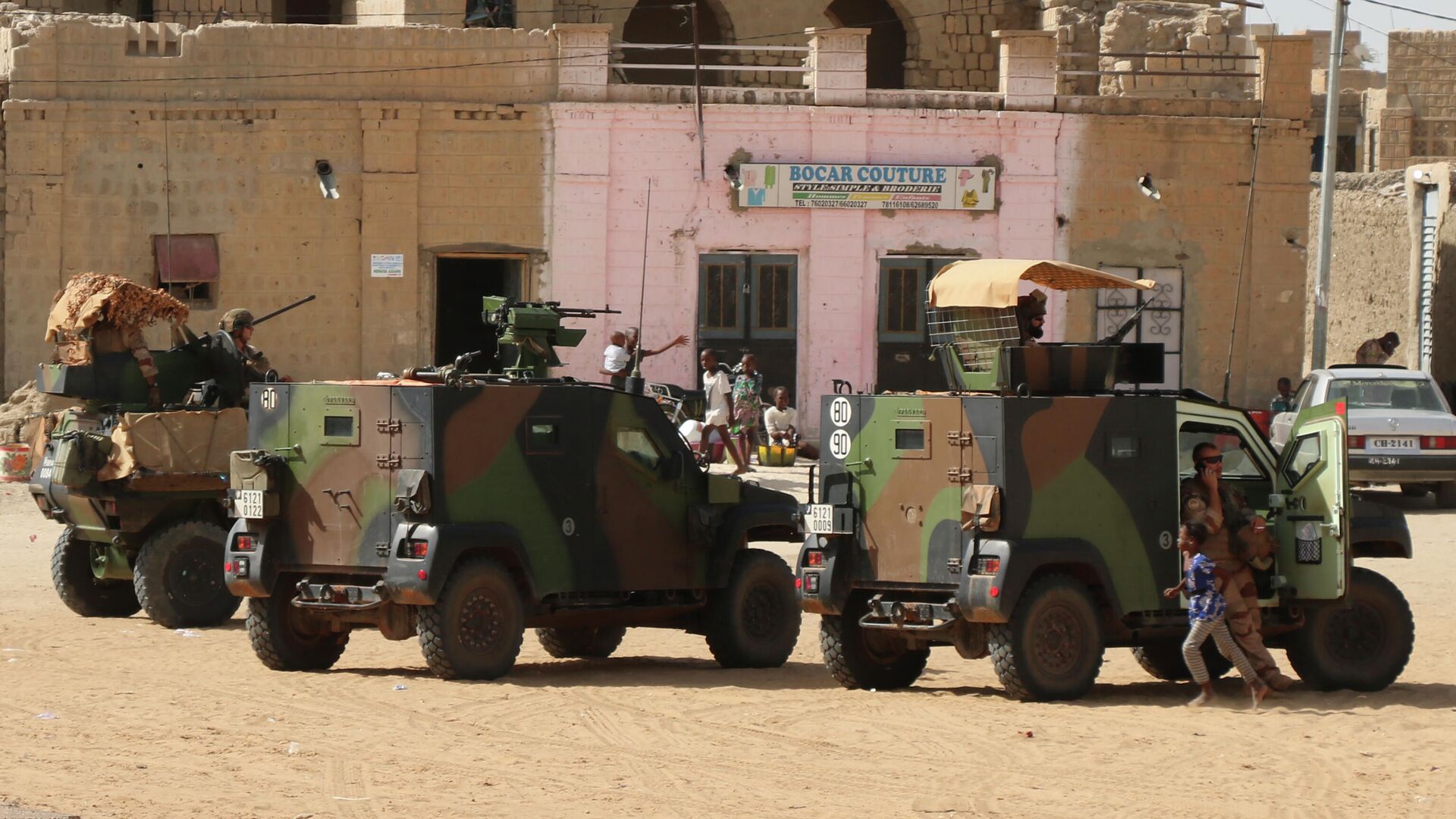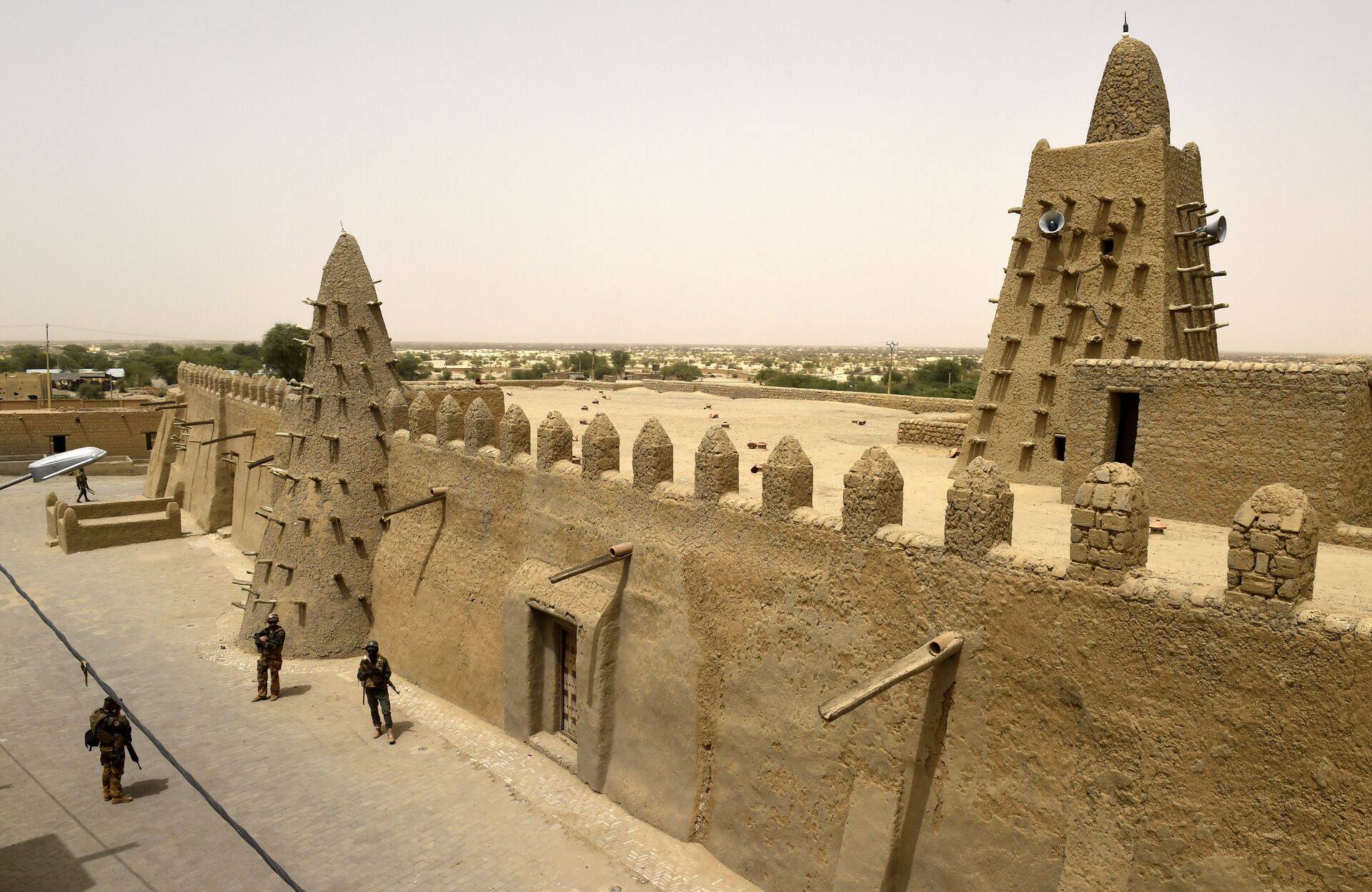French Barkhane Forces Leave Far Northern Tessalit Base Amid Continuing Mali Withdrawal

© AP Photo / MOULAYE SAYAH
Subscribe
French forces have quit their second base in northern Mali, where they were embroiled in a highly unpopular eight-year-long war against Islamist rebels that had long since become an ethnic conflict. The pullout is part of a shifting of French policy as President Emmnauel Macron prepares to seek reelection.
Control over Tessalit base in northeastern Mali, near its desertous border with Algeria, was handed over to Malian forces on Wednesday, according to AFP. It was the second northern outpost the French have left amid their force drawdown, after they left their base in Kidal, south of Tessalit, last month.
The French military chief of staff said in a statement that the transfer was "gradual, controlled and closely coordinated with FAMa [Malian Armed Forces] and the United Nations Multidimensional Integrated Stabilization Mission in Mali (MINUSMA), whose contingent of several hundred soldiers is permanently deployed in Tessalit."
The statement added that “several weeks” of “training sessions” with their Malian counterparts had preceded the transfer of power.
The withdrawal is part of the end of Operation Barkhane, Paris’ War on Terror-style campaign across Africa’s Sahel region, which began in 2013 as a mission to save Mali from likely collapse amid another coup d’etat and a rebellion by Tuareg tribes in the north, who declared their own state of Azawagh.
However, only about half of the 5,000-strong Barkhane force is being pulled out. According to AFP, Paris also plans to quit its base in Timbuktu and pull its remaining forces further south, toward the tri-border region where Mali meets Burkina Faso and Niger, to concentrate on a new counterterrorism mission dubbed the Takuba Task Force.
Backing Off Barkhane
Macron announced the policy shift in June, several weeks after a military coup in the Malian capital of Bamako removed the civilian president, prime minister, and defense minister, after they attempted to change the structure of the interim government to more favor the military’s civilian partners, the June 5 Movement - Gathering of Patriotic Forces (M5-RFP). Col. Assimi Goita, then the vice president, made himself interim president in the coup, but promised that scheduled elections to restore democracy would not be altered from their February 2022 date.
It was the second coup in less than a year: in August 2020, the military teamed up with M5-RFP to oust democratically elected President Ibrahim Boubacar Keita amid months of mass protests in a coup that Goita also led, and the tension between the civilian and military factions has been tight ever since.
Macron denounced the May 2021 coup and pledged not to cooperate with Goita’s new government, using the situation and the concurrent loss of confidence in the French mission to the Central African Republic to end Barkhane outright. However, the decision was also made as Macron announced his bid for a second term as president in the April 2022 French elections.

French soldiers of the 93rd Mountain Artillery Regiment and soldiers of the Malian Armed Forces patrol next to the Djingareyber Mosque
© AFP 2023 / PHILIPPE DESMAZES
The war is highly unpopular in both France and Mali, where the sentiment is that French involvement has made the situation worse. Last month, Malian Prime Minister Choguel Kokalla Maïga accused France of training the terrorists it claims to be fighting, telling RIA Novosti that French troops have denied Malian forces access to the Tuareg stronghold in Kidal, where he alleged French officers are allegedly training jihadists of the Ansar el-Din front, an offshoot of al-Qaeda*.
“We have proof of this. In our language there is a saying that when you’re searching for a needle in your room and the person supposedly helping you to look for it is sitting on it, you will never be able to find it. This is the current situation in Mali, and we do not intend to put up with it,” Maiga said.
It’s an accusation that goes back to the beginning of Barkhane. More recently, Yerewolo - Debout sur Les Remparts (The Worthy Sons - Standing on the Ramparts), a group opposing the French presence in Mali, said in June that French forces were a danger to other nations’ troops, such as the Germans, who did actually have Malian interests at heart.
The ill will might also be due to the fact that France once ruled Mali as a colony with an iron fist. Invaded by French forces in the late 19th century, Mali became part of the French Sudan colony, although anti-colonial resistance continued. The irrigable land was used for cotton and nut plantationing, while forced labor by Malians was used across the Empire. The country finally became independent in 1958, when the revolution in neighboring Algeria, also a French colony, forced Paris to renegotiate its relationship with its entire empire..
Mali Looks for Plan B
Maïga said in September that after the French forces withdraw to the south, Bamako will have to look for a “Plan B” - an indirect response to a question from the press about whether Mali was close to finalizing a rumored defense deal with Wagner Group, a Russian private defense contractor that Western media has falsely claimed is tied to the Russian government.
Russian Foreign Minister Sergei Lavrov subsequently confirmed on the sidelines of the UN General Assembly meetings that such a conversation had taken place.
"Since Mali’s authorities estimated that their forces were not enough without external support and since external support is reducing from those who pledged to help eradicate terrorism, they turned to a private Russian military company," Lavrov stated, adding that as it’s a private matter between a company and its client, "We don’t have any connection to that.”
Earlier this week, Malian Foreign Minister Abdoulaye Diop told Sputnik that construction of a Russian military base in the West African country “is not on the agenda.”
*A terrorist group banned in many countries.

